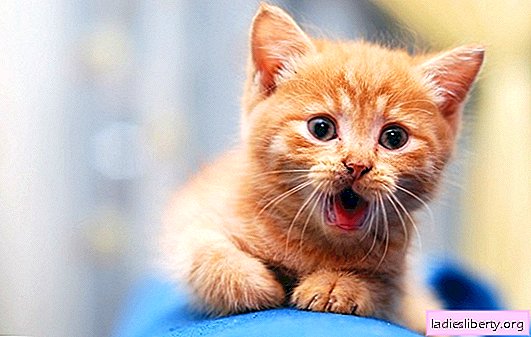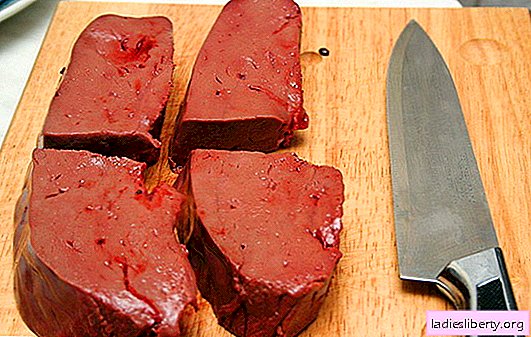
Panting, like many other changes that occur in the pet's body, cause excitement in caring breeders. This is understandable, because the animal can not talk about the pain or discomfort experienced by him, therefore, to recognize the problem in time and provide the necessary assistance is an important task for the owner. We will figure out what could be the reasons that the kitten is breathing heavily and what to do if such a condition is detected.
Features of the respiratory system of kittens
The respiratory system of a kitten is not too different from the human:
1. Inhalation: the lungs swell, so that air is drawn in through the nose, where it is warmed and filtered, passes through the pharynx into the larynx, from there into the trachea, then into the bronchi and lungs.
2. From the lungs, oxygen enters the bloodstream and is distributed throughout the cells of the whole body.
3. Exhale: the diaphragm relaxes, nitrogen, oxygen and carbon dioxide are removed from the bronchi.
In addition to supplying blood with oxygen, breathing also performs the function of thermoregulation, removing excess fluid.
The respiratory rate of adults is an average of 30 inspirations and expirations per minute, in kittens - about 40-50. Moreover, this indicator is approximate and variable, it depends on many factors, both the environment and the internal state of the animal.
The kitten is breathing heavily - reasons are within the normal range
Even if the kitten breathes heavily and often, this does not always mean that there are some serious health problems, the reasons for intensive breathing can be quite harmless:
1. Most often, normal rapid breathing is associated with stress experienced by the animal. It can be caused by many circumstances:
· Any medical interventions and medical procedures, from injections to taking pills.
· Visiting unfamiliar places, for example, a veterinary clinic.
· Ride in a car, bus or other vehicle.
· Contact with other animals, children, strangers.
2. The beginning of estrus in a kitten. In adults, such changes in the body as pregnancy and childbirth are also.
3. The absorption of food.
4. Overheating.
5. Increased physical activity during games and running.
All these situations do not pose any threat to the life and health of the pet. After eliminating the causes that caused the increase in frequency, breathing returns to normal. It is important to remember that stressful situations can cause other health problems for the kitten and should be avoided if possible.
The kitten is breathing heavily - pathological reasons
If it was not possible to connect the increased breathing rate with the above reasons, or the frequency of inspirations and exhalations does not normalize after a relatively short period, close attention should be paid to the animal’s health status. After all, the reasons that the kitten is breathing heavily can be serious violations of the internal organs and systems of the body.
The basis of respiratory failure may be pathology:
1. Problems with the nose. The inflammatory process is usually accompanied by secretions of mucus from the nasal passages.
2. Edema, tumors and other diseases of the throat and trachea.
3. Asthma, bronchitis and other bronchial diseases. In this case, the kitten will most likely have a fever and a cough.
4. Inflammation, edema and tumor of the lungs.
5. Helminthic invasion.
6. Dehydration.
7. Poisoning.
8. Hormonal disruptions.
9. Violations of the endocrine system.
10. Diseases of the cardiovascular system.
11. Anemia.
12. The fever.
13. Excess air or fluid in the chest cavity.
When you need to urgently contact a veterinarian
Many of these conditions are extremely dangerous and can be fatal. The success of treatment depends largely on how quickly treatment began. In order not to miss the moment when treatment will be possible, it is worth knowing the symptoms in which you need to show your pet to the doctor as soon as possible. This must be done if, in addition to rapid breathing, the following are observed:
- temperature rise;
- heart palpitations;
- wheezing in the chest;
- discharge from the nose;
- discharge from the oral cavity;
- Too pale or red shade of mucous membranes.
What will the vet do if the kitten is breathing heavily
When a kitten comes to a veterinarian's office due to rapid breathing, specialists usually carry out the following procedures:
- A survey of the owner about the time when rapid breathing was noticed, about the presence or absence of concomitant problems and about possible natural causes.
- A visual examination of the animal, during which the doctor determines whether the body is dehydrated, in what condition the mucous membranes, etc.
- Temperature measurement.
- Identification of helminthic invasion.
- Appointment of necessary additional laboratory tests. For example, a blood test to rule out anemia or infectious diseases.
- Referral for an ultrasound or X-ray, if there is a suspicion of a heart disease or other internal organs.
- A puncture of the chest wall (thoracocentesis), which allows you to determine if there is excess air or fluid in the chest cavity. It is applied only in extreme cases.
Possible treatment for rapid breathing
Of course, treatment directly depends on what caused the pathological rapid breathing. The most common treatment options can be divided into two categories:
1. Surgery (for oncology, injuries, etc.).
2. Drug therapy. Medicines for animals can be administered in various ways:
- Orally (through the oral cavity). Preparations can be in the form of tablets, solutions, capsules, powders, etc.
- Rectally (through the anus). The candles introduced in this way allow the animal to receive the drug without a high load on the liver.
- Subcutaneously (the needle is inserted into the crease obtained by pulling the skin). Most drugs are administered this way under the withers. In an emergency, this method is not very effective, since it takes time to absorb the drug.
- Intramuscularly (in cats, most often in the thigh muscle). This injection can be quite painful. The amount of the drug that can be administered in this way is limited by not too large doses.
- Intravenously (using a syringe or intravenous catheter). In emergency situations, this is the most effective method of therapy, because the drug immediately enters the bloodstream.
Possessing the above information, the pet owner has the ability to determine with relative accuracy whether the kitten’s intense breathing is a normal option or more like a pathological condition. Based on this, it is much easier to decide what to do if the kitten is breathing heavily: is it worth the wait or you must urgently contact a veterinary clinic.











